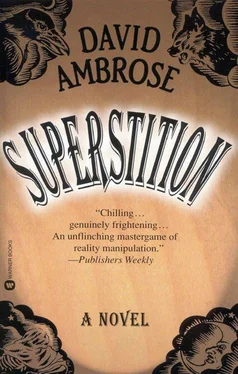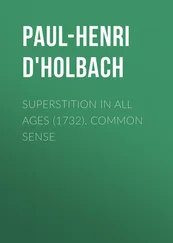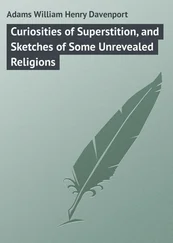David Ambrose - Superstition
Здесь есть возможность читать онлайн «David Ambrose - Superstition» весь текст электронной книги совершенно бесплатно (целиком полную версию без сокращений). В некоторых случаях можно слушать аудио, скачать через торрент в формате fb2 и присутствует краткое содержание. Жанр: Ужасы и Мистика, на английском языке. Описание произведения, (предисловие) а так же отзывы посетителей доступны на портале библиотеки ЛибКат.
- Название:Superstition
- Автор:
- Жанр:
- Год:неизвестен
- ISBN:нет данных
- Рейтинг книги:5 / 5. Голосов: 1
-
Избранное:Добавить в избранное
- Отзывы:
-
Ваша оценка:
- 100
- 1
- 2
- 3
- 4
- 5
Superstition: краткое содержание, описание и аннотация
Предлагаем к чтению аннотацию, описание, краткое содержание или предисловие (зависит от того, что написал сам автор книги «Superstition»). Если вы не нашли необходимую информацию о книге — напишите в комментариях, мы постараемся отыскать её.
Superstition — читать онлайн бесплатно полную книгу (весь текст) целиком
Ниже представлен текст книги, разбитый по страницам. Система сохранения места последней прочитанной страницы, позволяет с удобством читать онлайн бесплатно книгу «Superstition», без необходимости каждый раз заново искать на чём Вы остановились. Поставьте закладку, и сможете в любой момент перейти на страницу, на которой закончили чтение.
Интервал:
Закладка:
“Not really anything specific,” Sam said, hoping he wouldn't be forced to go into too much detail. “It's just that whatever's happening here is a family-linked thing- your family. I think you should stay together, support one another, and not expose yourselves unnecessarily to any influences that we don't yet understand.”
Bob Cross looked unconvinced. “I want to see that damn mirror for myself-the one with scratching on the back.”
“You will. Just give me a day or two-please?”
The older man's face took on an expression of reluctance, but he grudgingly agreed, “Okay, you're the expert. I guess we'd better listen to you.”
Sam felt an immense relief. “By the way,” he said, turning to Joanna and changing the subject, “I read your book. It's excellent.”
Her face lit up with pleasure. “Do you really think so?”
“It deserves to do well.”
“I really appreciate your saying that. Do you think we could discuss it sometime, at more length?”
“I'd be happy to.”
Things drew quickly to a close. Joanna's father, having been denied access to the “scene of the crime,” was impatient to be on the move, urging his two women to collect their belongings while he phoned down to the garage for his car. Sam said his formal good-byes to all three of them in the hotel suite, then Ralph accompanied them downstairs. When he returned, Sam was waiting for him.
“You handled that well,” Ralph said to him. “Thank you.”
“They're nice people. I hope this thing won't cause them any more upset than it has already.”
Ralph had taken a bunch of keys from his pocket, but kept them in his fist for the time being. “I don't know whether I should be giving you the keys to my house, or calling Bellevue and having you put under restraint,” he said. “But after last night, I guess I have to give you the benefit of the doubt.”
He held out the keys. Sam took them.
“Thanks,” he said. “If you move out of the hotel, let me know where I can find you.”
60
It took him several hours to write down the whole story. He wrote in longhand, sitting at the desk in the music room where Ralph composed his operas, which were mostly unperformed, although several orchestral pieces had been recorded on CDs that Sam found in a rack on the wall. He played a couple, and found them interesting but too obviously influenced by other composers to be memorable. He reflected, ungenerously perhaps, that it was the work of someone wealthy enough to indulge his passion, though not talented enough to earn a living from it. But he made no comment on the music in what he wrote, seeing no cause to offend the man who would most likely be the one to find and read the document.
It was only when that thought crossed his mind that Sam asked himself whether the words he was writing were in anticipation of his own death, a kind of valediction. He realized that they were. Although he did not assume that he was going to die (he no longer assumed anything), he did not see how he could continue to exist in his present state indefinitely. Six of the group were dead, and Joanna- his Joanna-had entered some strange limbo on the margins of a changed world in which he now found himself.
He did not speculate further upon his personal fate, merely wrote down the story in all the detail that he could recall, starting with his reading in Around Town of Joanna's expose of Camp Starburst and the cynical manipulations of Ellie and Murray Ray. He wrote of his first meeting with Joanna in a television studio, and then later on Sixth Avenue after her unnerving confrontation with Ellie. He wrote of how the idea of the experiment had been born, and how his relationship with Joanna had grown with it. In swift and simple prose he set down all that had happened from that time until the time of writing almost twelve months later, and a universe apart.
What does that mean, a universe apart? Am I speaking of parallel worlds? And if so, what does that mean? It's just an idea, a way, one of many, of describing the strangeness of nature when we examine her closely. We know that in truth there is only one world: the one we are in. We know too that concepts like space and time are merely constructs of our consciousness, not things “out there” existing independently of us.
Physicists, it is said, have paid a high price for their understanding of nature: they have lost their hold on reality. Of course, that was “reality” as defined by common sense-a transaction between “out there,” where the world was, and “in here,” where we were. Now that distinction has disappeared; the common sense that took it for granted has been proven an untrustworthy ally. There is nothing to lose our hold on anymore. That which holds and that which is held are one and the same; observer and observed are merely parts of a spectrum, neither one existing independently of the other.
In physics we have had to learn a language that reflects both the precision of our knowledge and the ambiguity revealed by it. An electron, for example, is not a particle or wave; it is both. It exists in a “superposition of states”-until we want it, for the purposes of measurement, to be one or the other. Then it will oblige us.
The universe in which we live is as much conceived by us as we are by it. Obvious simple rules like cause and effect have lost their power. Niels Bohr defined causality as no more than a method by which we reduce our sense impressions to some kind of order.
No one disputes the reality of this strangeness on the microscopic level. The only question has been whether it could carry over into the macroscopic world of our daily lives. There is increasing, indeed by now overwhelming, evidence that it can.
I myself, sitting here, am living proof.
He set aside his pen and leaned back to look up at the ceiling. It was barely visible beyond the penumbra of the lamp on the desk. Night had fallen while he wrote. He searched for a summing up, a final phrase that would crystallize and give shape to what he was trying to say.
It was of course a hopeless task. There was no such thing as a last word.
“Living proof,” he read, and picked up his pen, but wrote no more.
Because in that moment he had heard her voice. Quite distinctly though not loudly. Nor was he sure where it had come from.
He stood up silently, as though the least sound he made might frighten her off and he would lose her, perhaps this time for good.
“Joanna?” he called out softly.
There was no response. Only then did he realize that, although he'd heard her voice, he had no idea what she'd said. Had he really heard her? Or was his mind playing tricks?
He stepped out onto the landing and listened in the darkness. The house was silent except for the muffled sound of traffic in the street. He called her name again.
“Joanna…?”
Still no response. Then, somewhere above, he heard a faint, brief sound, as though someone had passed quickly and lightly over a loose floorboard.
The darkness around him grew deeper and more dense as he turned a corner on the stairs, losing the last reflected light from the music room below. He paused and spoke again, in barely a whisper.
“Joanna, are you there…?”
Again he heard her voice, closer this time, and in a whisper like his own. There could be no doubt it was her voice, but still he couldn't understand what she was saying.
“Joanna…? Where are you…?”
He groped in the darkness for a light switch, and cried out in shock as his hand connected with the feel of warm, firm flesh. Her unseen fingers interlaced themselves with his, and held him tight.
“I'm here,” she said. Her voice was clear now, so close to him that he could feel her breath on his. Her body pressed against him, soft and warm. He held her naked in his arms, and in the dark her lips found his.
Читать дальшеИнтервал:
Закладка:
Похожие книги на «Superstition»
Представляем Вашему вниманию похожие книги на «Superstition» списком для выбора. Мы отобрали схожую по названию и смыслу литературу в надежде предоставить читателям больше вариантов отыскать новые, интересные, ещё непрочитанные произведения.
Обсуждение, отзывы о книге «Superstition» и просто собственные мнения читателей. Оставьте ваши комментарии, напишите, что Вы думаете о произведении, его смысле или главных героях. Укажите что конкретно понравилось, а что нет, и почему Вы так считаете.








